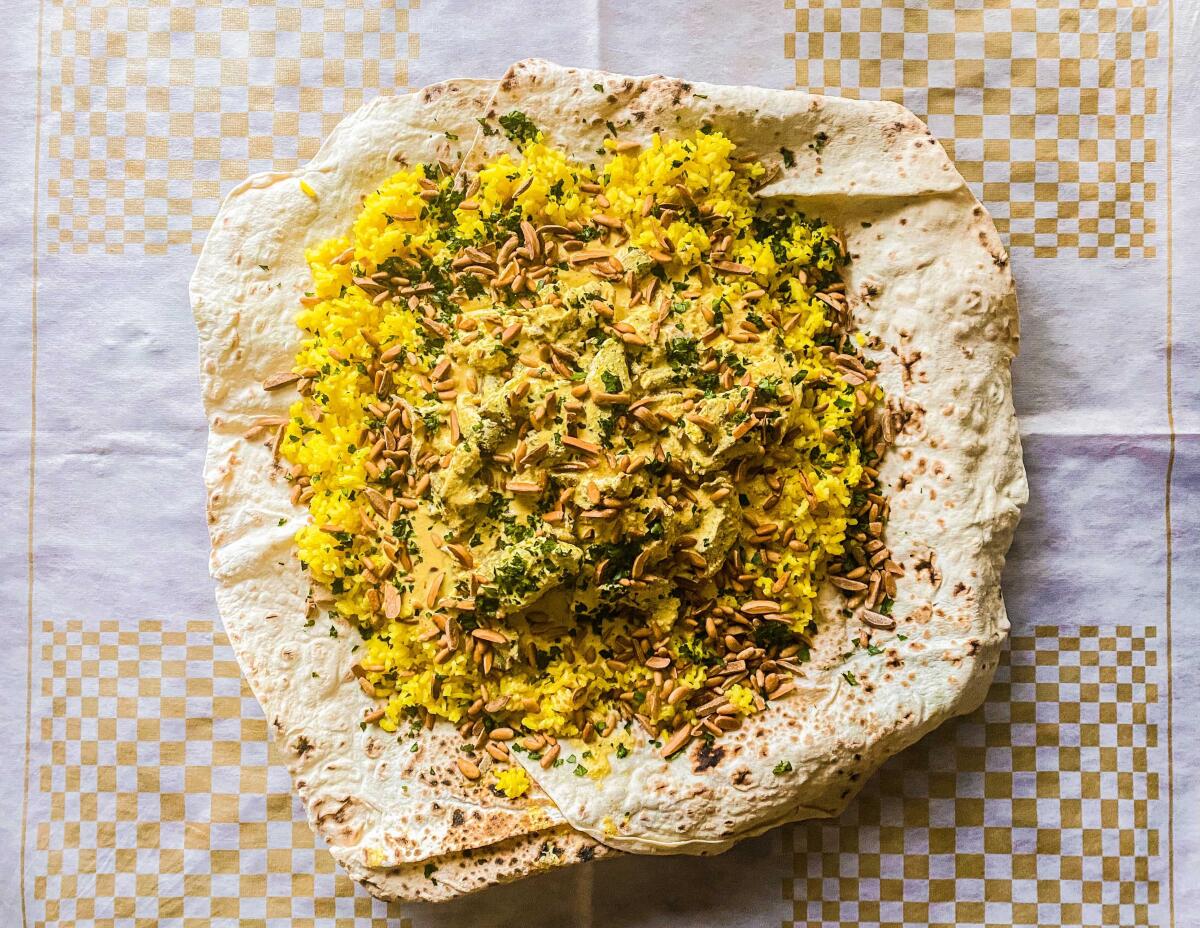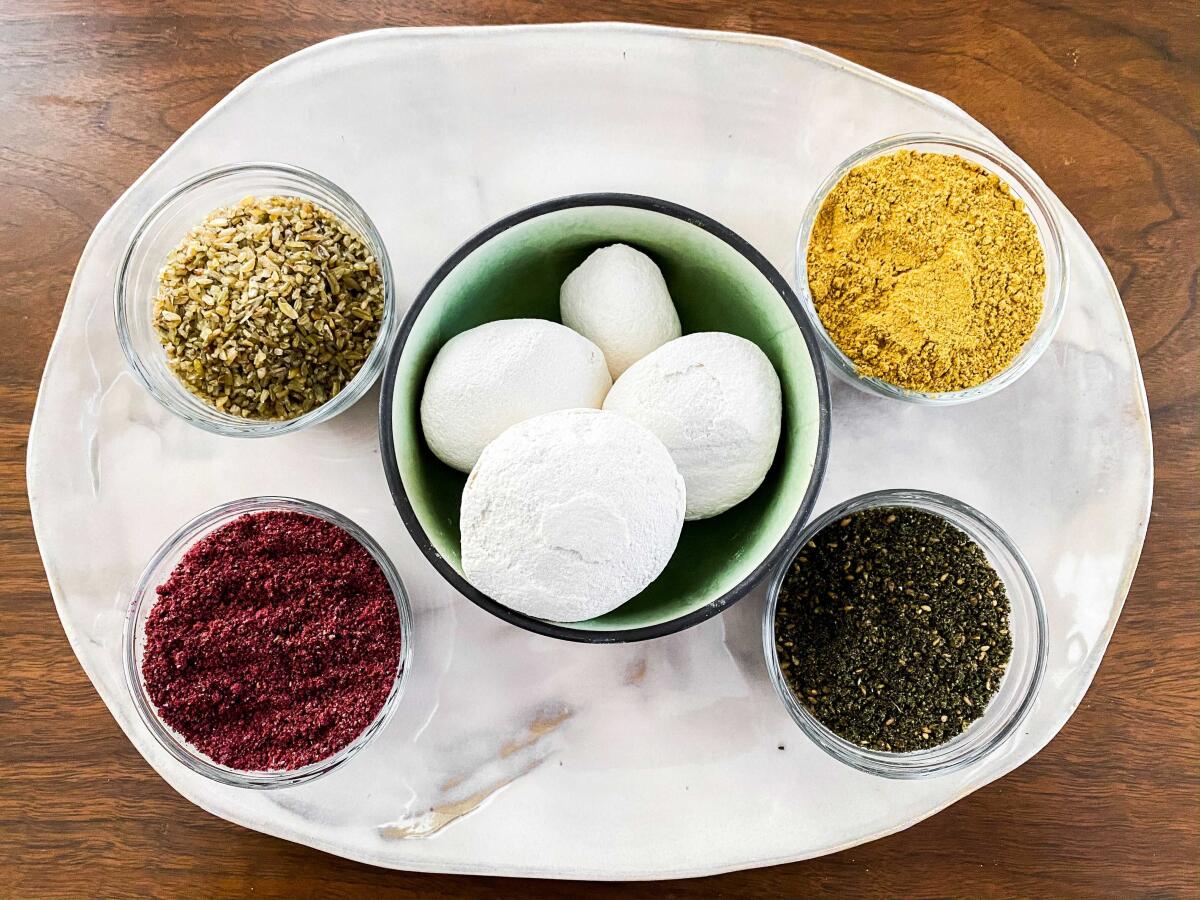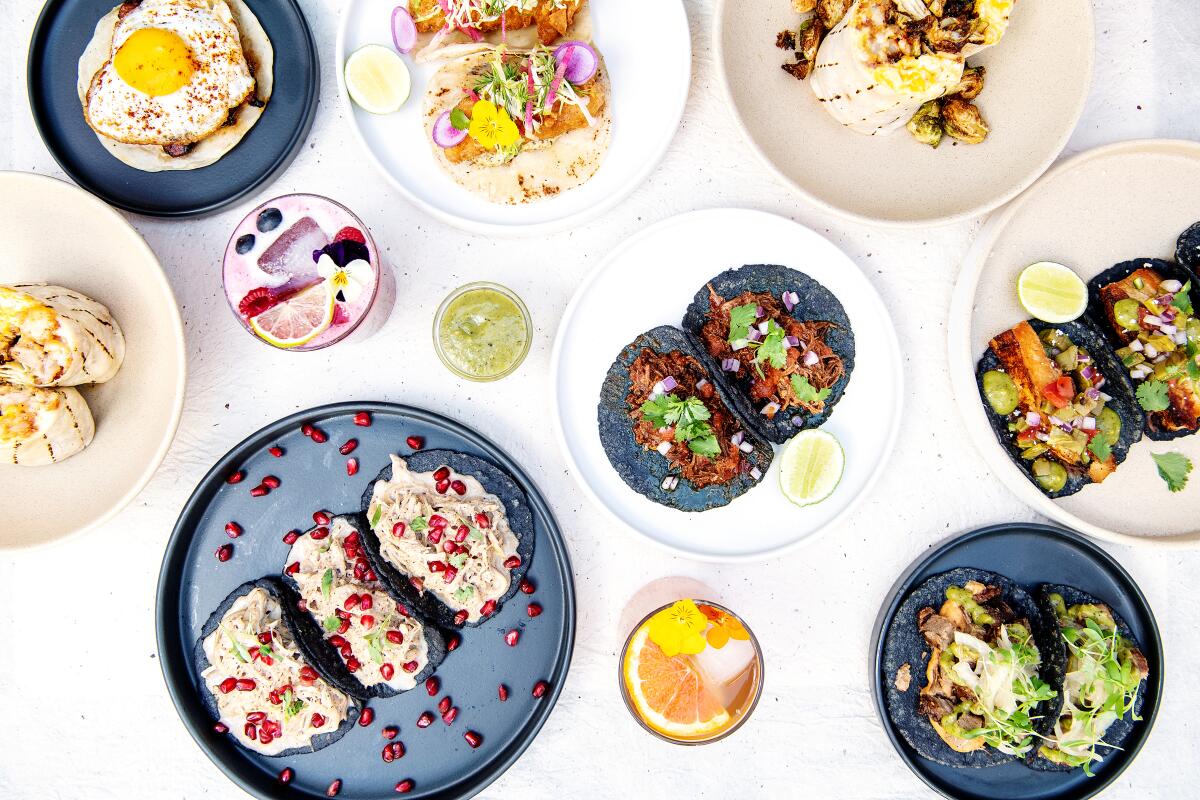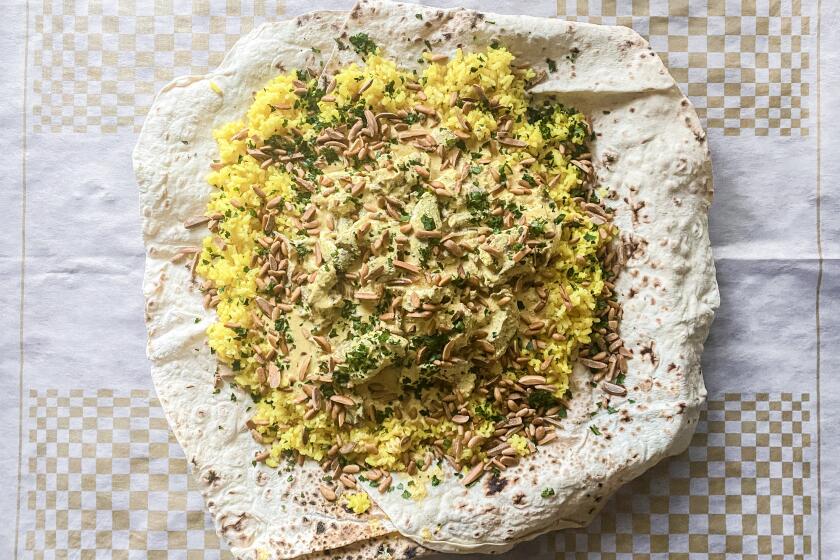The secret ingredient to a lavish Bedouin feast

- Share via
Earlier this month a video clip circulated on the Insta feeds of some friends: Its title is “Arab grandmas try Trader Joe’s za’atar.” You can probably guess these women’s reactions — a lot of confused, sour expressions. “La,” they mutter and exclaim (the word means no in Arabic).
A Trader Joe’s fan account had posted a jar of the spice blend in January that showed the label. Among the listed ingredients are coriander, chickpea flour, sunflower oil and lemon oil. Yeah. La.
Enjoying this newsletter? Consider subscribing to the Los Angeles Times
Your support helps us deliver the news that matters most. Become a subscriber.
Za’atar is the Arabic name for origanum syriacum, an herb native to the Levantine swath of the Middle East that includes Lebanon, Palestine, Syria, Jordan and
modern-day Israel. The flavor, though wholly its own, lands in a Venn diagram of thyme, oregano and marjoram. Za’atar is also the name of the dried herb mixed as a seasoning with sumac, sesame seeds and salt. Traditionally it needs nothing more. At tables across the Levant, za’atar is stirred with olive oil into a dip for bread; the combination also glosses manakish, the flatbread sold from corner stores that’s a ubiquitous, portable breakfast.
The grandma video was produced by Z&Z, a D.C.-based company that sells za’atar (the spice blend) produced in Palestine. I haven’t tried it yet. A new venture out of Brooklyn, though, is selling wonderful, fragrant za’atar and other products from Palestine that have been spurring my kitchen projects.
Eat your way across L.A.
Get our weekly Tasting Notes newsletter for reviews, news and more.
You may occasionally receive promotional content from the Los Angeles Times.
Manal Nasan and her husband, Nidal, launched Re7het Falasteen in December. The business’s name translates as “the fragrance of Palestine.” It evokes the experience the couple would have as they unwrapped care packages full of spices they would receive from Nidal’s parents, who live near Ramallah in the West Bank.
Coordinating with his family, Manal and Nidal are importing groceries produced by their favorite Palestinian growers and farmers in the region: goat cheese made in a style resembling feta; samneh (ghee); excellent freekeh, the roasted green wheat with a trace of smokiness that cooks like rice; and spice blends for dishes like maqluba, Palestine’s celebratory dish of meats, vegetables and rice flipped upside down from the pot into a triumphant savory cake.

Scanning Re7het Falasteen’s website, one rare gem leapt out. Jameed is a Bedouin method of preserving yogurt by drying it into pale spheres slightly larger than golf balls. I haven’t found jameed in Los Angeles (if anyone knows where to find it, let me know), but it adds the key flavor to mansaf, a layered platter of bread, rice and lamb in spiced yogurt sauce that’s often called the national dish of Jordan. It is loved in parts of Palestine as well as in other Middle Eastern countries.
For a recipe I turned to Anissa Helou’s magnum opus, “Feast: Food of the Islamic World.” I bought fresh, papery lavash and short-grain rice from Glendale Ranch Market, an Armenian-owned market that carries a strong selection of staples for cooking Levantine cuisines.
The jameed that Re7het Falasteen sells is made using goat’s milk yogurt, though sheep’s milk is also common. It needs to soak overnight to reconstitute. Its taste, if I’m to reach for a Western equivalent, reminds me of Pecorino Romano. Yes, the cheese is sheep’s milk, but the jameed’s concentrated intensity gives it the same pleasant salty-sharpness. You knead it satisfyingly into its soaking water before combining it with thick yogurt spiked with saffron, cinnamon and allspice. Then you heat it to a boil, stirring intently to keep the sauce from curdling, while lamb shanks finish simmering in another pot.
I veered from the recipe in only one way (well, besides not making my own flatbread): I added ½ teaspoon of turmeric to the buttery rice, a fillip from a mansaf recipe in “The Palestinian Table” by Reem Kassis and in other variations I scanned online. I mention it because I know Helou and she would not personally sanction the derivation, but it gives the presentation undeniable pop.
My friend Khaled has been in my close circle of dining friends since the pandemic started. He came over while I pulled it all together — yanking the meat from the shanks and folding it into the yogurt sauce, laying the bread over a platter, piling on the rice, spooning the lamb atop (with plenty of sauce on the side) and finishing with a shower of toasted almonds and pine nuts.
Somehow, the jameed magnified the scent and flavor of the saffron in the sauce, which we swiped the bread through and poured over the rice in pools of sunshine.
Growing up, Khaled and his Palestinian family ate mansef for special occasions. He grinned after a few bites. “Yep, you got the dish,” he said. I felt proud, but really what I got was the crucial ingredient and the soundest possible recipe. And a reminder from Arab grandmas to stay close to traditions while I’m studying a region’s cuisines.
Mansaf
Dinner with Pizzana and Eric Wareheim
The next L.A. Times Dinner Series event is a pizza and wine party that takes place on Sunday, March 14. Times food columnist Jenn Harris hosts actor and pizza aficionado Eric Wareheim (“Tim & Eric,” “Master of None”) for an online conversation along with chefs in three cities, including Daniele Uditi of Pizzana in Los Angeles. On the day of the event, participants pick up Pizzana’s signature cacio e pepe pizza, along with a bottle of Las Jaras Glou Glou red blend, and join the talk at 5 p.m.
Tickets are $95 per person, with a minimum of two tickets per household. The charity partner for the event is Project Angel Food.
Have a question for the critics?
Our stories
— This week I wrote about Macheen, a pop-up taqueria that has touched down at Milpa Grille in Boyle Heights. You need a massive breakfast burrito and a few tacos (chicken with white mole, birria, pork belly … and maybe a beer-batter fish taco in there too).
— Jenn Harris reports on an infuriating trend: “Some people are scamming restaurateurs with fraudulent credit cards, while others request refunds, claiming they never received part or all of an order.” The story centered on Spoon by H, which is closing (but will likely be returning after a GoFundMe effort has helped raise tens of thousands of dollars for the restaurant).
— Right this way to Lucas Kwan Peterson’s official Girl Scout cookies power ranking.
— In that spirit, Ben Mims brings you a recipe for a homemade take on Thin Mints.
— Ben also asks you to embrace the humble beauty of kohlrabi.
— Finally: Couldn’t we all use some levity? Please watch Jenn, Ben and Lucas eat and rank fast food fish sandwiches. (Spoiler: There is one that tastes distinctly of a “burning gas leak.”)

Eat your way across L.A.
Get our weekly Tasting Notes newsletter for reviews, news and more.
You may occasionally receive promotional content from the Los Angeles Times.




